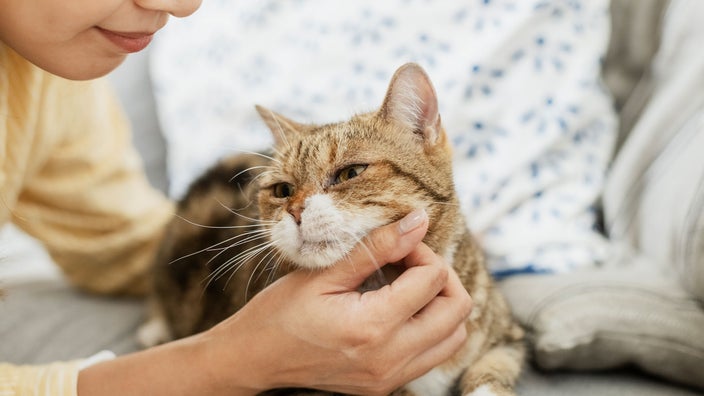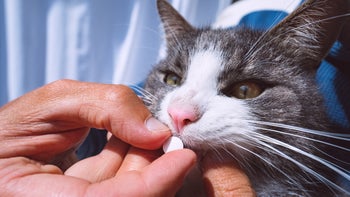
Solensia (Frunevetmab) for Cats: The First-Choice Medication for Arthritis Pain in Cats
Key takeaways:
Veterinarians have limited treatment options for managing arthritis pain in cats. That’s because cats’ bodies can’t break down certain pain medications easily.
Solensia (frunevetmab) is the first FDA-approved medication for arthritis pain in cats. It’s also the first treatment of its kind to be approved for animals.
Solensia is available from veterinarians and is given as a monthly injection. The cost varies, but it generally ranges from $75 to $115 per shot.
Table of contents

As your cat gets older, you might start to notice they can’t get up and down from their usual spots as easily. This may be a result of aging, but it can also be a sign of arthritis (osteoarthritis). Arthritis frequently affects dogs. But it can affect cats too.
Nonsteroidal anti-inflammatory drugs (NSAIDs) are often used to manage arthritis pain in dogs, like people. But long-term use of NSAIDs in cats can potentially cause kidney damage. This leaves veterinarians with limited options for treating arthritis in cats.
In January 2022, the FDA approved Solensia (frunevetmab) as a treatment for arthritis pain in cats. The injectable medication is also the first of its kind to be approved for an animal.
Search and compare options
Solensia for cats at a glance
Common names | Solensia (frunevetmab) |
What it treats | Arthritis |
How it comes (forms) | Injection |
Dosage | Based on your cat’s weight |
Common side effects | Vomiting, diarrhea, pain at the injection site, head and neck scabbing, irritated and itchy skin |
Average cost | $75 per shot for cats who weigh less than 15.4 lbs, and $115 for cats over 15.4 lbs |
What is Solensia (frunevetmab)?
Solensia is an injectable monoclonal antibody medication approved to treat arthritis pain in cats. Monoclonal antibodies are lab-made proteins that can target certain substances in the body. Many monoclonal antibodies are already approved for human use. But Solensia is the first treatment of its kind approved for animals. The prescription-only medication is administered by a veterinarian once a month.
How does Solensia work to treat arthritis pain in cats?
Solensia works by lessening pain signals in your cat’s body. It does this by targeting and attaching to a protein called nerve growth factor (NGF). NGF is thought to be a driver of arthritis pain and has been found in higher levels in arthritic joints.
Solensia is not a cure for arthritis. But it might help your feline friend move around easier and improve their quality of life.
How long does it take Solensia to work?
The amount of time it takes Solensia to work can vary based on your cat. But many owners start to see signs of improvement in their cat within 3 weeks of starting treatment with the medication.
One study on Solensia’s effectiveness found that more than 75% of cats showed improvement within 3 months of starting treatment.
How is Solensia given to cats, and what is the standard dosage?
A veterinarian will inject your cat with Solensia once a month at their clinic or by a mobile vet at your home. It’s given as a subcutaneous (under the skin) injection. The dose your cat will receive is based on their weight. There’s one dose for cats who weigh less than 15.4 lbs and another dose for cats who weigh more.
Other arthritis treatments: Solensia is one option for managing arthritis pain in cats. Check out other things you can do to help make your cat more comfortable.
Feline pain symptoms: Cats are good at hiding their pain. But if you learn to recognize these common pain symptoms, you’ll be able to decode cat pain in no time.
Regular vet visits: Cats should visit their veterinarian for a regular checkup at least once a year. Here’s why it’s important for your cat’s health.
What are the known side effects of Solensia?
As with all medications, Solensia can cause side effects. The more common ones seen in clinical trials were relatively mild. These side effects included:
Vomiting
Diarrhea
Pain at the injection site
Scabbing on the head and neck
Irritated skin
Itchy skin
Monoclonal antibodies like Solensia can cause serious allergic reactions, some of which may be life-threatening. This can happen soon after the injection or after you leave the appointment. If you think your cat is having an allergic reaction, get emergency veterinary help.
Read more like this
Explore these related articles, suggested for readers like you.
It’s also possible for your cat’s body to make antibodies against the medication. These are called antidrug antibodies. If this happens, Solensia won’t work as well for your cat.
Solensia shouldn’t be given to cats who are pregnant, could be pregnant, or are nursing. The medication could harm unborn kittens or kittens who are nursing, since it can be excreted in the milk of a nursing cat.
Solensia’s safety hasn’t been evaluated beyond 6 months of use. So the long-term effects aren’t fully understood. A veterinarian will determine how your cat is responding to treatment and how long they should continue taking the medication.
Does Solensia interact with other medications?
We don’t have a lot of information on what medications Solensia may interact with. But veterinarians typically use caution when prescribing Solensia and NSAIDs at the same time because of the potential for interactions. Solensia may also interact with other monoclonal antibody treatments.
How effective is Solensia?
Solensia’s effectiveness was studied in two clinical trials. Since cats can’t tell you when they’re in pain, the responses to treatment were mostly based on assessments by the cats’ owners. The owners watched for things like changes in their cat’s ability to do certain things, like groom themselves or jump onto higher surfaces, after the injection.
In a 3-month study, cats who received Solensia were more likely to be considered treatment successes than those who didn’t receive the medication. Similarly, another study showed improvements in mobility for cats receiving Solensia.
How does Solensia compare with other treatments?
Solensia is the first FDA-approved medication for arthritis pain in cats. Other medications are considered off-label for cats with arthritis. This means that they’re not approved by the FDA, but there’s evidence they’re safe and work for cats. Medications like gabapentin, tramadol, and amantadine are sometimes used off-label in this way for cats with arthritis.
Some veterinarians may also decide to use NSAIDs off-label for arthritis pain in certain cats. For example, there are two FDA-approved NSAIDs for cats: meloxicam and robenacoxib. They’re both approved only for a short period of time to manage pain after surgery, rather than for a long-term condition like arthritis. That’s because cats can’t break down these medications very well, which increases the risk for serious side effects.
Steps that don’t involve medication can also be taken to help make your cat more comfortable if they have arthritis. For example, making sure they maintain a healthy weight can help take pressure off their joints. You can also raise their water and food bowls, give them steps or ramps for higher surfaces, and provide soft bedding.
How much does Solensia cost?
The cost of Solensia will vary depending on your cat’s weight, where you live, and the veterinarian. In general, Solensia costs about $75 per shot for cats that weigh less than 15.4 lbs and $115 for cats over 15.4 lbs.
Since Solensia is given by a veterinarian or a licensed vet tech, you may need to pay an appointment fee in addition to the cost of the medication. Talk to your veterinarian about what you can expect to pay for each shot.
Frequently asked questions
If your cat misses a dose of Solensia, get them scheduled for the dose as soon as you realize. After a veterinarian gives the missed dose, they will change your cat’s dosing schedule to make sure your cat gets their injection monthly. In the meantime, your cat may show some signs of arthritis pain until they receive the missed dose.
Cats who are allergic to frunevetmab, the active ingredient in Solensia, should not take Solensia. Solensia is also not available for cats who weigh less than 5.5 lbs. Cats who are pregnant or nursing also should not receive Solensia.
There aren’t many safe options to treat arthritis long term in cats. But veterinarians will sometimes prescribe gabapentin, tramadol, and amantadine for arthritis in cats.
Can you give your cat a Solensia injection at home?
No. Solensia injections must be given by a veterinarian or a licensed vet tech. If you’re worried about taking your cat to a veterinary clinic every month, search for a mobile veterinarian. Mobile vets can come to your home to give your cat their injection.
The bottom line
Solensia (frunevetmab) is the first FDA-approved medication that treats arthritis pain in cats. It’s given as a once-monthly injection that’s administered by your cat’s veterinarian. If you’re interested in learning more about medication options for arthritis pain, ask a veterinarian if Solensia could help. Making accommodations for your cat and helping them maintain a healthy weight are other steps you can take to make them more comfortable.
Why trust our experts?



References
American College of Veterinary Surgeons. (n.d.). Osteoarthritis in cats.
Booth, D. M., et al. (2023). Solensia™ (frunevetmab injection): An arthritis medication just for cats. Veterinary Partner.
Budde, J. A., et al. (2023). Frunevetmab. Plumb's Veterinary Drug Handbook, 10th Edition. Wiley-Blackwell.
Enomoto, M., et al. (2019). Anti-nerve growth factor monoclonal antibodies for the control of pain in dogs and cats. VetRecord.
Gruen, M. E., et al. (2021). Efficacy and safety of an anti-nerve growth factor antibody (frunevetmab) for the treatment of degenerative joint disease-associated chronic pain in cats: A multisite pilot field study. Frontiers in Veterinary Science.
Gruen, M. E., et al. (2021). Frunevetmab, a felinized anti-nerve growth factor monoclonal antibody, for the treatment of pain from osteoarthritis in cats. Journal of Veterinary Internal Medicine.
Jacob, J. A., et al. (2023). Monoclonal antibodies show promise as new therapy for veterinary patients. American Veterinary Medical Association News.
U.S. Food and Drug Administration. (2022). FDA approves novel treatment to control pain in cats with osteoarthritis, first monoclonal antibody drug for use in any animal species. PRNewswire.
U.S. Food and Drug Administration. (2022). Get the facts about pain relievers for pets.
U.S. Food and Drug Administration. (2024). Information about the boxed warning on Meloxicam labels regarding safety risks in cats.
U.S. Food and Drug Administration. (2025). Osteoarthritis in cats: More common than you think.
Zoetis. (2021). Solensia [package insert].





























